|
The
Latin America and Caribbean - European Summit
in Rio de Janeiro |
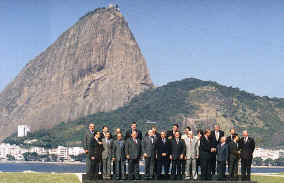 At the Sugarloaf Mountain
At the Sugarloaf Mountain
|
|
Basic information
on Brazil: click here
|
99.06.28
- 99.06.29 |
Photography
& Design © E. Habich 1999
(click all images to enlarge)
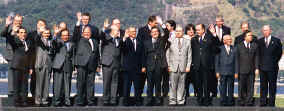
Large
canvas family picture in Rio de Janeiro with the Chilean Prime Minister,
Brazilians President Henrique Cardoso,
German Chancellor Schroeder, France's President Chirac, Argentinean
Head of State,
the Mexican Prime Minister, the English Prime Minister, the
Finnish President, and many others...
Brazilian Impressions
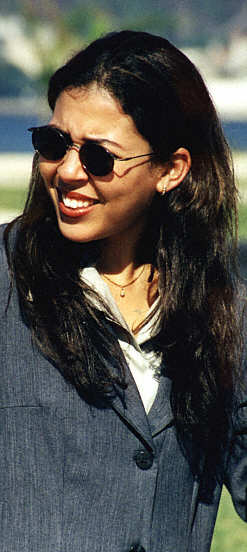

The Brazilian Secret Service
had a tight grip on the situation...
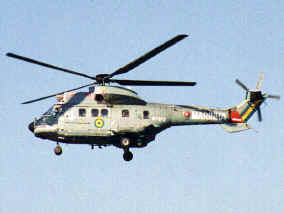
...a touch of "Apocalypse Now" was added to the scene by
cruising Brazilian Army Helicopters (image can be used as wallpaper).
click here
to see the hidden side of
the Brazilian secret service...
Image from the first Press-Briefing
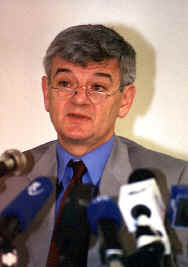
German Foreign Minister Joschka Fischer
at the initial Press conference of the German Delegation
(transcript to follow...)
Skip transcript?
to view more pictures: click
here
Opening address by Federal Chancellor Gerhard Schroeder
EU-Latin America Caribbean Summit
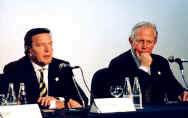
Rio, 28 June 1999
Dear Fernando Henrique Cardoso,
I would like to thank you, on behalf of my European colleagues as
well, for the cordial welcome and the excellent preparation of this
summit of the Heads of State and Government of the European Union,
Latin America and the Caribbean. I want to thank you also that you
have arranged in a very friendly way our seating so that we Europeans
could appreciate the incomparable panorama of Rio, a city of which
so many Europeans are dreaming.
Our common history as we all know, spans a period of over 500 years.
On the eve of a new millenium we are meeting at this high level for
the first time. We want to establish a strategic partnership between
Europe, on the one hand, and Latin America and the Caribbean, on the
other hand, a partnership which will help shape the architecture of
international relations, this at least is our resolve.
We will be building on the solid foundation of relations between our
two world regions. Both Europe and Latin America and the Caribbean
are simultaneously cultivating close relations with the United States
of America and Canada. We Europeans want to further extend the transatlantic
partnership; only a few days ago President Clinton was in Bonn for
the EU/US summit.
On the other hand the western hemisphere is preparing to establish
a free trade zone from Alaska to Tierra del Fuego with effect from
2005. Against this background - and with a view to our meeting today
and tomorrow in Rio - the outlines of a comprehensive transatlantic
triangle are emerging. This certainly includes economic competition,
but also and above all: economic cooperation. And this involves closer
political cooperation as well as an even tighter cultural interdependence.
Europe needs and wants strong and stable partners. We therefore support
the cooperation and integration in Latin America and the Caribbean.
This not only involves the integration of markets and trade. The European
Union owes its unique success worldwide in particular to the political
dimension of integration.
The last six months have brought three decisive developments, not
to say breakthroughs, for Europe:
1. The first important date was the introduction of the Euro. Since
1 January 1999 eleven European countries have had a common currency:
a step which will leave its mark on the international currency system.
Do not be deceived by short-term fluctuations in the Euro against
the Dollar. The Euro will be a stable currency supported by the largest
economic area in the world.
2. In March this year we adopted in Berlin what we called Agenda 2000
and what constitutes the financial architecture for Europe for the
years 2000 to 2006 and what constitutes at the same time the bases
for the enlargement of Europe towards the East and the Southeast.
Europe will not remain - that is our firm determination - a continent
confined to the border of the Oder, to the border towards Poland,
Czechnia and Hungary or towards any other country. This established
a decisive pre-requisite for the enlargement of the European Union.
3. Europe has learned from the experience of Kosovo. At the European
Council in Cologne we decided to take now the next step towards a
common security and defense policy.
These six months have also brought important progress in cooperation
between Europe and Latin America: shortly before this summit it was
possible to adopt a mandate for negotiations on free trade between
the EU and Mercosur and also with Chile. I consider this to be a big
progress, and the qualification used by President Cardoso when he
spoke of a "historical dimension", I consider it absolutely
right. You all know that it was not easy. I would ask you to remember
that such an agreement between two areas of integration has never
existed before. We are breaking new ground. I would like the negotiations
to be conducted swiftly and to reach a successful conclusion.
Economic prosperity with a chance to share in the fruits of their
combined labors for as many people as possible requires political
stability. Following their return to democracy and the establishment
of Mercosur, Brazil and Argentina have renounced any nuclear rivalry.
Both have now signed the non-proliferation treaty. Looking at the
situation in southern Asia, I would say that Mercosur, Latin America
and the Caribbean have taken the better path.
Rightly so, for the new European Union represents a historically unique
example of the peace-building effect of political and economic integration
across borders. War between members of the European Union has today
become unthinkable. That success story has now to be expanded and
the countries of central and south-eastern Europe prepared for EU
membership.
This also includes the Balkans, where over the last ten years the
Belgrade regime has been responsible for a succession of wars, population
displacements and ethnic hatred. NATO has demonstrated that the international
community is no longer prepared to put up with that. With the stability
pact for south-eastern Europe we have laid the foundations for that
region also to become a haven of peace and progress, because we all
know: in the long run political stability and peace can only be secured
if solid economic and social bases are established.
I am well aware that in Latin America and the Caribbean a leading
role for the United Nations was considered important. I can assure
you that we were and are of the same mind and have therefore done
our utmost to overcome the Security Council´s inability to act, by
involving Russia and consulting with China.
The United Nations is a driving force behind the peace settlement
and we are also grateful to our Latin American and Caribbean friends
for their support for the steps required. At the same time, developments
have once again shown the need for reform of the United Nations. We
stand by the United Nations charter, just as we stand by the Universal
Declaration of Human Rights adopted 50 years ago - without any possible
doubt -.
That also means that we cannot stand idly by while murder and deportation
deprive entire populations of their elementary rights and neighboring
countries are substantially destabilized as a result.
Latin America and the Caribbean are now free of international conflicts.
The agreement between Peru and Ecuador has shown that regional peace
efforts can be a successful way of settling disputes. Central America´s
civil wars are at an end and the difficult stage of consolidating
internal peace and democracy has begun. This also means that it must
be possible for the majority of the population to live in dignity
and free from poverty.
Hurricane Mitch has set back many areas of Central America by years.
The European Union has decided on a EURO 250 million program of assistance,
in addition to the many bilateral initiatives by EU Member States.
Latin America now needs to built internal peace and consolidate democracy.
In Colombia - we see this with great respect - President Pastrana
has shown great courage in holding peace talks with all warring factions.
In that he enjoys our absolute support. At the same time I appeal
to those who up to now have resorted to violence to put an end to
it. Massacres by paramilitary forces are to be condemned in just the
same way as terrorism. Hijacking aircraft or dragging people off in
the middle of church services are criminal acts. There can be no justification
for such deeds.
Building internal peace also means tackling organized crime and especially
drugs crime. In April, experts from Europe, Latin America and the
Caribbean launched a joint mechanism...
further
scan
preview: The Heads of State of South-America,
the Caribbean and Europe meet outside the "Rio Restaurant"
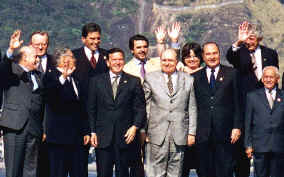
The serene Heads of State are having fun giving one of their colleagues
rabbit-ears
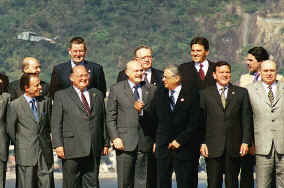
The Brazilian President entertains his guest apparently with anecdotes...
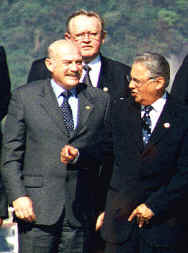
...dangerous Close-Up of Fernando Henrique Cardoso's
argument. Who or what is he trying to measure up?
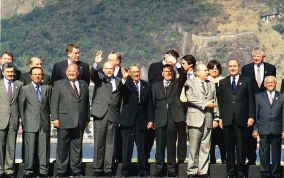
Waving at the Media in Rio de Janeiro
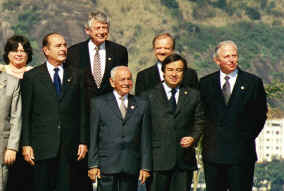
French, Dutch, Spanish, (Swedish?), English and European Union
Leaders like to smile in Rio (who's the small fellow?)
Images from the Dinner Party
held in the gardens of the
Museum of Modern Art, Rio
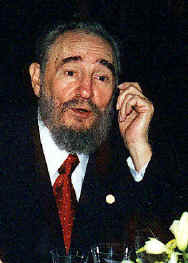
|
Fidel
Castro participated at the Dinner Party in the Museum of Modern
Art (MAM) in Rio de Janeiro. It was hosted by the
President of Brazil and Mrs. Ruth Cardoso...
|
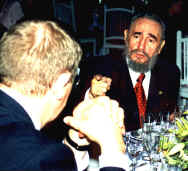
| Fidel Castro talking to the Danish Prime Minister
Poul Nyrup Rasmussen |
Images from the unveiling of a sculpture
in
the Sculpture Gardens in Rio
by EU-President
Jacques Santer
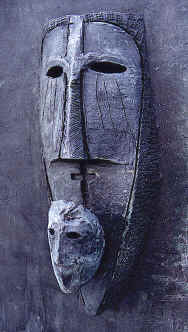
Detail of Sculpture on the fusion of Christianity
and Afro-Caribbean religion (Obâ) as unveiled by
EU-President Jacques Santer
Images from the final Press-Conference
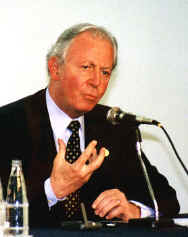
EU - President Jacques Santer
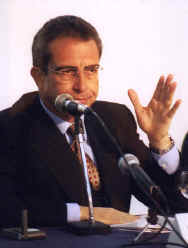
The Mexican President Ernesto Zedillo
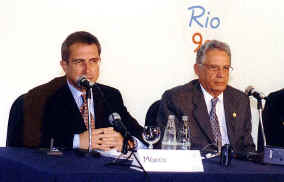
The Mexican President Ernesto Zedillo and
Brazilian President Fernando Henrique Cardoso
|

















